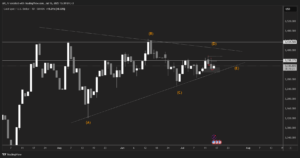Recession fears and worries over new COVID lockdowns in China hit risk sentiment, pulling stocks lower and lifting the USD
- USD/JPY rises to a fresh 24-year high on central bank divergence
- Oil falls as China lockdown fears and recession worries hurt the demand outlook
- Gold falls as rate hike bets rise following the stronger US NFP
European and US stocks booked weekly gains last week as investors weighed up aggressive central bank monetary policy with the rising prospect of recession against better-than-expected US ISM services PMI and US jobs data.
US non-farm payroll showed 372k jobs were added in June, well ahead of the 270k forecast and down modestly from the 390k in May. The unemployment rate held steady at 3.6% data reflects a resilient jobs market defying recession fears.
Meanwhile, commodity prices fell across the week on a deteriorating demand outlook as recession fears gathered pace. This helped ease inflation concerns, and investors dialled back expectations of aggressive moves by central banks. The DAX gained 1.5%, snapping a five-week losing run, while the S&P 500 gained 1.9%.
As we head into the new week, these narratives will likely continue playing out along with rising concerns over more COVID lockdowns in China. Asian markets traded mostly lower on Monday amid a new wave of COVID in China, fueling fears of more lockdown restrictions in the world’s second-largest economy at a time when it is attempting to recover from harsh lockdown restrictions in the second quarter. Europe is also pointing to a weaker start with the DAX set to drop 1.4% and the FTSE 1.3%.
Today’s economic calendar is quiet, with just New York Federal Reserve President Williams due to speak. Hawkish comments could lift the USD and pull stocks lower. In the UK, domestic politics are likely to steal the show as more Tories put themselves forecasts for the leadership battle. Meanwhile, the energy crisis will likely remain the central focus in Europe.
Looking out across the week, US inflation data is expected to be the key focus, and forecasts for consumer prices to keep rising to 8.7% YoY in June.
FX
In the FX markets, the USD strength and dovish BoJ comments have lifted USD/JPY above 137.00 to levels last seen in 1998.EUR/USD is also resuming its move southwards amid rising speculation that the pair could fall to parity this quarter on the eurozone’s deteriorating economic outlook.
Oil
Oil has fallen around $1 heading towards the European open. The fall comes following volatile trading last week, when oil dropped almost 10% on Tuesday on recession fears, before clawing back 5% at the end of the week as tight supply concerns dominated. Today, worries over more China COVID curbs outweigh supply worries.
In the wider energy market, Nord Stream 1 pipeline is closing for 10 days of scheduled repairs from 11th – 21st July. The big concern is whether the gas supply will be switched back on. Failure of gas flows to restart would spark a deep economic slowdown in the eurozone, with supply to industry expected to be the first area to be rationed. This could also boost demand for oil as industries look to switch away from gas to oil, which is ironically proving to be the cheaper alternative.
Gold
Gold prices fell 3.3% last week, its fourth straight weekly decline and the steepest loss since early May. After hitting its lowest level this year, the precious metal struggles, due to USD strength and aggressive Federal Reserve bets. After the stronger than expected non-farm payroll, a 75 basis point rate hike is 93% priced in, with speculation now growing of a 100 basis point hike.
Disclaimer: This article is not investment advice or an investment recommendation and should not be considered as such. The information above is not an invitation to trade and it does not guarantee or predict future performance. The investor is solely responsible for the risk of their decisions. The analysis and commentary presented do not include any consideration of your personal investment objectives, financial circumstances, or needs.





